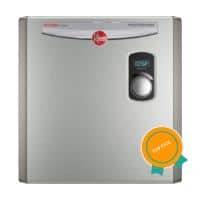How Tankless Water Heaters Work?
As depicted by its name, tankless water heaters don’t have a storage tank. You may wonder how they work despite one.
Tankless water heaters heat your cold water supply as soon as you turn on a faucet. The cold water passes through the tankless water heater and uses electricity, natural gas, or propane to heat water instantly.
In this way, you won’t have to wait for a storage tank to fill with hot water before dispensing hot water. Tankless water heaters dispense on-demand hot water.
On average, depending on the size and usage, these units have a flow rate of 2 to 5 GPM. Electric water heaters without a tank have a higher flow rate compared to gas tankless water heaters.
Compared to propane or electric water heaters, a gas water heater would cause hindrances if you plan to run multiple fixtures at the same time.
Best Tankless Water Heater Comparison
| Image | PRODUCT/ Features | Rating | |
|---|---|---|---|
Top Pick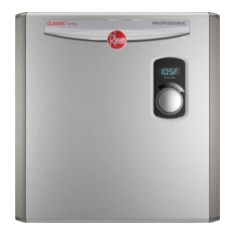 |
Rheem RTEX-24Temperature Range: 80 – 140 Fahrenheit Flow Rate: 5.9 GPM Price: $$$ Type: Electric Weight: 17.8 pounds Warranty: 1-year |
|
Read Full Review |
Propane Pick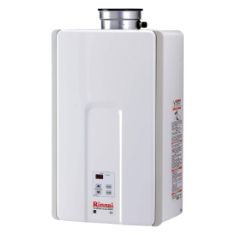 |
Rinnai V75iPTemperature Range: 98 -140 Fahrenheit Flow Rate: 7.5 GPM Price: $$$$ Type: Propane Weight: 45.6 pounds Warranty: 1-year |
|
Read Full Review |
Electric Pick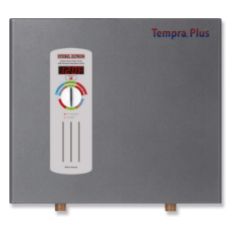 |
Stiebel Eltron Tempra PlusTemperature Range: 86 -140 Fahrenheit Flow Rate: 8 GPM Price: $$$ Type: Electric Weight: 19 pounds Warranty: 3 years |
|
Read Full Review |
Gas Pick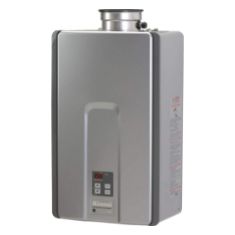 |
Rinnai RL75INTemperature Range: 98 – 140 Fahrenheit Flow Rate: 7.5-9.8 GPM Price: $$$$ Type: Gas Weight: 50 pounds Warranty: 1-year |
|
Read Full Review |
RV Pick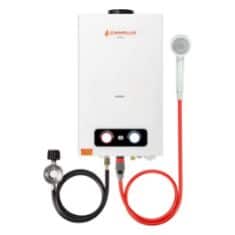 |
Camplux Pro 2.64 GPMTemperature Range: 46 – 115 Fahreheit Flow Rate: 2.64 GPM Price: $$ Type: Propane Weight: 18 pounds Warranty: 1-year |
|
Read Full Review |
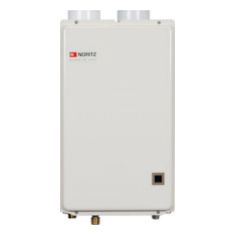 |
Noritz NRC661-DV-NGTemperature Range: 90 – 140 Fahrenheit Flow Rate: 6.6 GPM Price: $$$$ Type: Gas Weight: 11.42 pounds Warranty: 1-year |
|
Read Full Review |
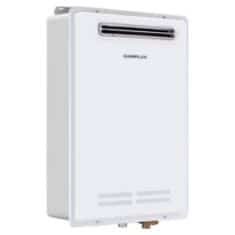 |
Camplux Pro 6.86 GPMTemperature Range: 41 – 122 Fahrenheit Flow Rate: 6.86 GPM Price: $$$ Type: Propane Weight: 49.7 pounds Warranty: 1-year |
|
Read Full Review |
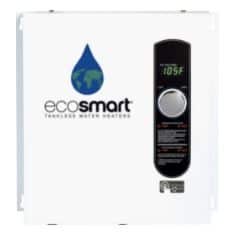 |
EcoSmart ECO 27Temperature Range: 80 – 140 Fahrenheit Flow Rate: 6.5 GPM Price: $$ Type: Electric Weight: 11 pounds Warranty: Lifetime |
|
Read Full Review |
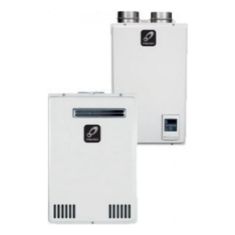 |
Takagi T-H3M-DV-NTemperature Range: 99 – 167 Fahrenheit Flow Rate: 6.6 GPM Price: $$$ Type: Gas Weight: 44 pounds Warranty: 5 years |
|
Read Full Review |
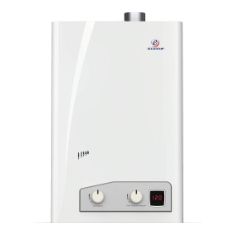 |
Eccotemp FVI12-LPTemperature Range: 80 – 140 Fahrenheit Flow Rate: 3.6 GPM Price: $$ Type: Propane Weight: 33 pounds Warranty: 2 years |
|
Read Full Review |
Best Tankless Water Heaters Reviews
1. Rheem RTEX-24 (Top Pick)
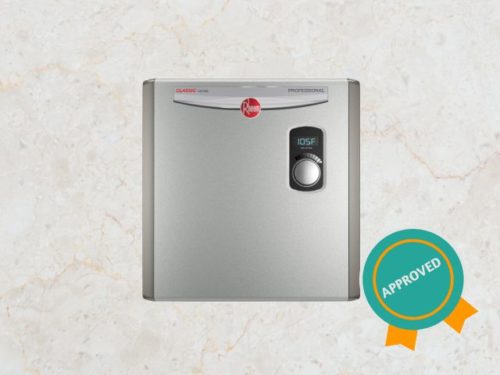
Rheem is one of the top electric tankless heaters available on the market! That’s also why it is our top pick.
The RTEX-24 is known as a classic professional water heater. It guarantees to supply on-demand hot water to multiple or even single points of use.
The water heater itself is encased in a steel alloy for durability. It has a sleek modern gray finish to blend in with your home.
This electric heater has a digital temperature display so the temperature changes are visible to you. Whether it be mildly cold water or extremely hot water, this water heater provides both.
You can change the temperature through 1 Fahrenheit increments. The Rheem RTEX-24 has a temperature range of 80 to 140 Fahrenheit.
The RTEX-24 also uses heating elements made from copper that are easy to work with and are more durable.
Rheem’s RTEX-24 includes a self-modulating feature. This feature ensures you’re constantly met with your demand for hot water all the time!
The Rheem RTEX-24 is one of the best tankless electric water heaters for medium-sized homes!
Customer Rating – 4.5 out of 5 stars.
+ Highly energy efficient
+ Self-modulating feature
+ On and off dial control
– Not suitable for large homes
2. Rinnai V75iP (Propane Pick)
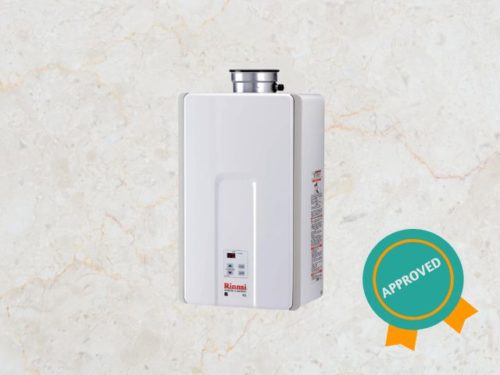
If a tankless gas water heater or an electric one isn’t your choice, the Rinnai V75iP is a great propane pick for a tankless water heater.
The Rinnai V75iP is an indoor tankless water heater. It is designed to give you the best water heating experience and to ensure you receive the value for your money.
With a flow rate of 7.5 GPM, the V75iP promises a consistent heavy stream and supply of hot water. You could operate multiple points of use at the same time with consistent hot water.
In addition, these tankless heaters are powered by propane which aims to save more energy and result in a lower electric bill.
Not only does the Rinnai V75iP promise to be energy efficient but it is also constructed with a space-saving design. You can install this water heater simply wherever it seems viable to fit.
This water heater is also equipped with self-protection safety features such as scale detection to ensure your investment.
The right tankless unit will save you money and energy unlike a traditional tank heater, and the Rinnai V75iP does just that!
Customer Rating – 4.6 out of 5 stars.
+ Self-protection features
+ Propane-powered
– Very pricey
3. Stiebel Eltron Tempra Plus (Electric Pick)
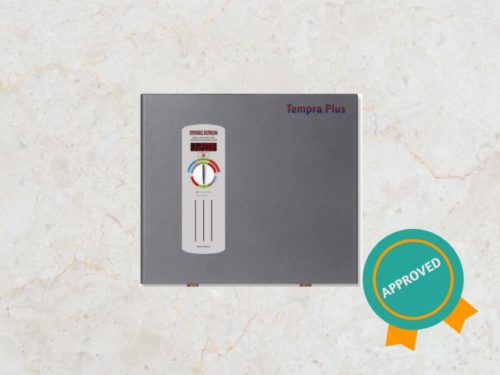
With more than 90 years in the hot water industry, the Stiebel Eltron Tempra Plus is one of the best tankless water heater brands.
With some water heaters, you might have to wait for hot water if it depletes. The Stiebel Eltron heater does not make you wait!
It comes with an advanced control feature. This feature helps maintain the water temperature to ensure you get heated water whenever required.
The unit is self-aware to acknowledge when the hot water capacity is about to run out to lessen the flow rate. This allows you to have a steady stream of hot water.
The Stiebel Eltron Tempra Plus operates on a no sound system for a quiet operation no matter where you install it.
You might wonder if being an electric water heater, this unit will use twice the amount of energy thus resulting in higher bills.
However, that is not the case! This electric tankless water heater is up to 99% energy efficient which ensures you save energy rather than spend double.
Customer Rating – 4.5 out of 5 stars.
+ Constructed with solid copper for durability
+ It is equipped with the self-modulating technology
+ Includes a 7-year leak warranty and a 3-year warranty for parts
4. Rinnai RL75IN (Gas Pick)
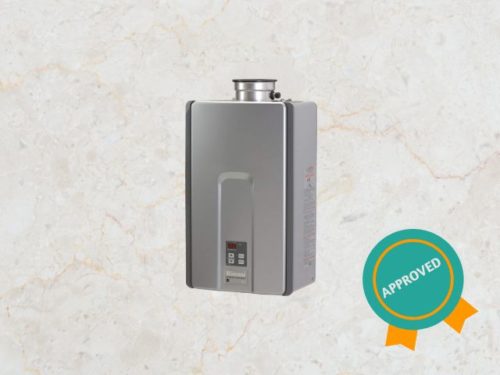
Rinnai holds one of our top electric tankless water heaters picks which is why it is also one of the best gas tankless water heaters.
Even with a gas tankless heater, Rinnai promises ease of use and comfort over anything.
No matter the incoming water temperature, the RL75IN guarantees a consistent water supply without any disturbances in the flow rate.
The Rinnai RL75IN is a guaranteed durable gas tankless water heater that will last you longer compared to other units.
This company uses the latest technology to improve your experience. The RL75IN makes use of recirculation technology to get hot water to you faster.
Other features include voice activation and you can also connect this unit to your home’s WiFi connection.
Rinnai’s RL75IN are made for indoor installation and use. But it also comes with a flow rate ranging between 7.5 to 9.8. This is the optimum flow rate for a medium-sized family or home!
But the best part of this gas tankless water heater is its promise to save you up to 32% in water and energy costs!
Customer Rating – 4.6 out of 5 stars.
+ Uses recirculation technology
+ Compact design saves space
+ Durable and reliable
– Indoor installation only
5. Camplux Pro 2.64 GPM (RV Pick)
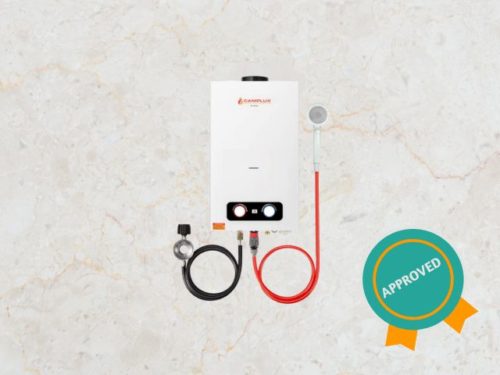
The Camplux Pro 2.64 is the ultimate outdoor propane tankless water heater.
If you’re someone who’s on the road a lot or an avid camper, this would be an essential water heating product for you.
The Camplux Pro has a flow rate of 2.64 GPM. This is enough to supply water to one bathroom or kitchen at the same time.
This is why the Pro 2.64 GPM is the ultimate tankless water heater option for small homes, cabins, and especially an RV!
This unit is only suitable for small outdoor spaces, which is why it is built with a compact space-saving design as well!
Camplux Pro has a water heat exchanger that uses advanced combustion technology. The addition of this feature promises endless hot water without wasting propane.
These features allow Camplux water heaters to fulfill their aim; energy efficiency and reducing power wastage. That’s why this unit comes with a guaranteed 11.5% energy-saving technology.
For its longevity and durability, the 2.64 GPM also has safety features. These include anti-freezing and overheating protection to protect your units in outdoor settings during harsh temperatures.
The Camplux Pro 2.64 GPM is our most preferable propane-powered tankless water heater pick for an RV!
Customer Rating – 4.2 out of 5 stars.
+ Optimum for small settings
+ Portable
+ Durable
6. Noritz NRC661-DV-NG
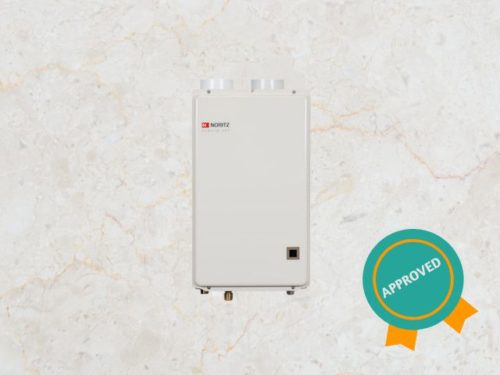
The Noritz NRC661-DV-NG is a condensing tankless water heater that enables it to be one of the most energy-efficient units.
These gas-powered heaters have an EF rating of 0.91. This indicates that the Noritz gas tankless unit helps in energy savings significantly.
With a flow rate of 6.5 gallons per minute, this tankless water heater works best in any indoor setting. If you’re a medium-sized family, this unit would be the optimum tankless water heater.
The Noritz gas tankless heaters can supply hot water with one of the highest flow and efficiency rates.
Its other features include a highly advanced heat exchanger design and a built-in controller that allows for hot water all the time.
This unit is a condensing tankless water heater which increases the water heater’s rate of performance as well!
Noritz’s main goal is to use the latest technology to give you the most easy-to-use water heaters that are worth your money!
Customer Rating – 4.4 out of 5 stars.
+ Compact and lightweight design
+ It has one of the highest energy-efficiency ratings in a gas water heater
– The unit can change sizes due to the condenser
7. Camplux Pro 6.86 GPM
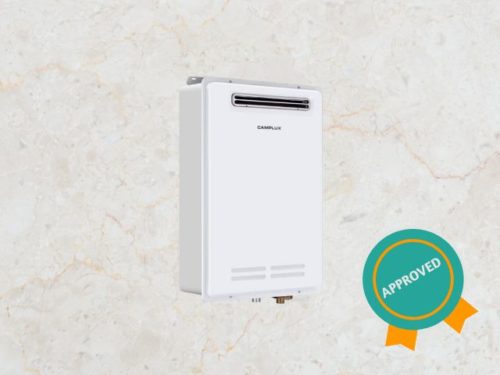
There’s an endless list of propane water heaters, but the Camplux Pro 6.86 is most definitely one of the best.
The Camplux Pro water heaters have efficient water flow control. This allows them to supply hot water anytime you need it.
This tankless water heater has a flow rate of 6.86 GPM and works optimally for a medium-sized household of 3 to 4 people.
These water heaters are best used as residential systems for whole house water heating. However, they require an outdoor installation.
Camplux Pro’s 6.86 heats water efficiently with added safety features to make sure they last long. These features include anti-scalding and direct current frequency conversion.
Combined both these features protect your propane-fueled water heater from burning accidents or strong winds.
The Pro 6.86 is up to 89.98% energy efficient. It is equipped with a stainless steel burner and a nitrogen combustion design to maximize energy use and reduce waste.
This water heater is a great outdoor unit that is extremely portable as well!
Customer Rating – 4.2 out of 5 stars.
+ Portable
+ High water flow and capacity
– Preferable for outdoor installations only
8. EcoSmart ECO 27
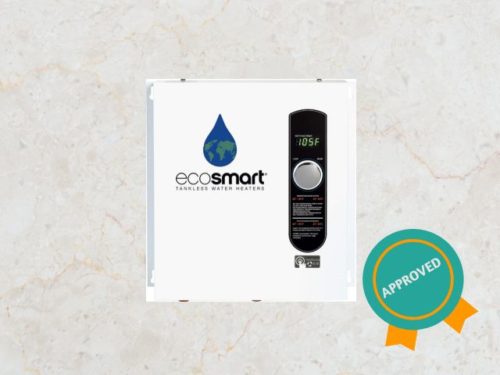
Another one of the best electric tankless water heaters, the EcoSmart ECO 27 is built to make life easier for you.
If you’re looking for low heating bills, instant hot water in an electric tankless water heater, the EcoSmart ECO 27 is it!
This unit has a flow rate of 6.5 GPM which is optimum for a household of 3 to 4 people. You can use this tankless water heater to get hot water in two faucets at the same time.
EcoSmart’s self-modulating technology allows you to regulate the amount of energy that is needed to heat your water supply.
These electric tankless water heaters are constructed to provide hot water in extremely cold climates without a change in the flow rate.
Most water heaters cause hindrances with changes in the climate and tend to have lower water pressure. However, EcoSmart ECO 27 water heaters guarantee a consistent hot water stream.
They are best suited for an indoor installation and can also be used for a larger household in some instances.
It is encased with a digital temperature dial that allows you to make temperature changes in single increments.
Enjoy instant cold to hot water in a short time with the EcoSmart ECO 27 electric water heater!
Customer Rating – 4.5 out of 5 stars.
+ Reliable and durable
+ Lifetime limited warranty
+ Easy to replace parts
9. Takagi T-H3M-DV-N
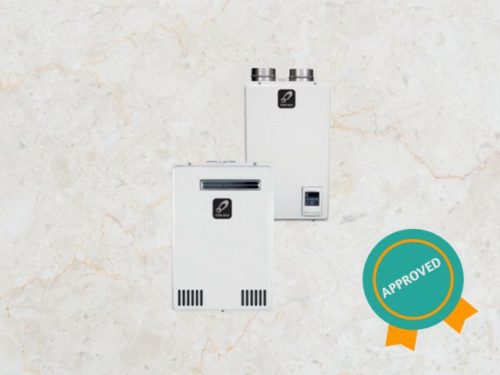
The Takagi T-H3M-DV-N is a Japanese manufactured and produced gas heater.
These gas tankless water heaters can be used in a wide variety of applications. These include hydronic heating systems, storage tanks, recirculation systems, and even domestic use.
The Takagi T-H3M-DV-N are gas water heaters. However, they are also extremely energy efficient while being gas models.
To guarantee you energy savings and energy efficiency the Takagi T-H3M-DV-N has an energy star approval.
These condensing water heaters come with direct vents for the safety of your family. Other safety features include temperature control and an overheating cut-off fuse. Additionally, this unit also has an anti-freezing internal safety control.
Being a condensing gas water heater, this Takagi unit helps you save energy up to 10%, unlike traditional water heaters.
This helps you be more energy-efficient as well. These tankless units have a 5 year limited warranty period compared to an average of 1 year for most water heaters!
Customer Rating – 4.2 out of 5 stars.
+ Significantly energy efficient
+ Energy-star approved
– Heavy design
10. Eccotemp FVI12-LP
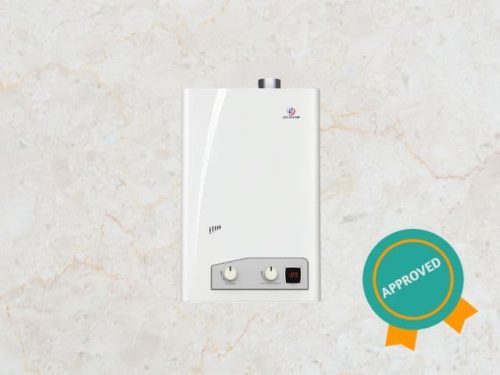
Eccotemp FVI12-LP are propane-fueled tankless water heaters that are best suited for a small indoor installation. They can be installed in small houses, apartments, or cabins.
This tankless water heater promises hot water constantly while being highly energy efficient. These heaters use a propane flame only when cold water passes through instead of all the time.
They heat water only when needed whilst ensuring your hot water supply never depletes no matter the temperature rise or fall.
The Eccotemp water heater is a manual heater with a digital temperature display that allows you to adjust the water temperature and water pressure by yourself.
This unit requires a 120-volt power supply to function. It also comes with a safe electronic ignition system and has a low noise operation.
With a flow rate of 3.6 GPM, the FVI12-LP is a great liquid propane tankless water heater that can supply hot water to two faucets at a constant temperature.
The Eccotemp FVI12-LP calls itself an energy saver since it guarantees to use fuel only when needed!
Enjoy endless hot water with one of the best energy-saving tankless water heaters!
Customer Rating – 3.8 out of 5 stars.
+ Energy-saving water heater
+ Extremely affordable
– The low flow rate cannot be used for large houses
Types Of Tankless Water Heating Systems
To understand which tankless heating system would be the best for you, you must familiarize yourself with the types of tankless heating systems there are.
Condensing Unit
These condensing water heating systems use a second heat exchanger to heat water even further.
They do this by eliminating the heat from the exhaust and reuse it to heat water even further. The best part is that it has one of the highest EF ratings between 0.92 and 0.94.
That’s why condensing heaters are highly energy-efficient and save up to $100 in energy costs.
However, condensing water heaters are more expensive compared to their other types due to a higher rate of energy savings.
Non-Condensing Units
Non-condensing water heaters are considered the first generation of water heaters. Unlike condensing units, non-condensing units don’t use a second heat exchanger.
However, these models let out hot exhausts which means you need to install stainless steel vents first before opting for these units.
These units are also energy efficient with an EF rating of 0.82 to 0.85. They also contribute between $75 to $80 in energy savings annually.
However, the best feature about non-condensing heaters is that they are cheaper compared to condensing units and lighter.
Condensing Hybrid Units
Condensing hybrid water heaters aren’t entirely tankless but come with a small capacity holding tank. These tanks usually have a capacity of 1 to 2 liters.
This is why they are known as hybrid models.
The smallholding tanks act as storage tanks for the heated water. This leads to even greater energy savings compared to condensing or non-condensing units.
Overall, hybrid water heaters have an EF rating between 0.92 to 0.96 making them the most energy-efficient models. This also means that they are more expensive compared to non-condensing or condensing units.
Point Of Use Unit
As depicted by its name, a point-of-use water heater is installed as close as possible to the hot water outlet.
Water is then immediately heated, whether it be for a hot shower, kitchen, or bath, instead of heating a whole house system.
These models are especially beneficial for the fixtures that don’t get enough hot water from your pre-installed water heating appliances.
However, although they are significantly energy-efficient, installing multiple point-of-use heaters will be more costly.
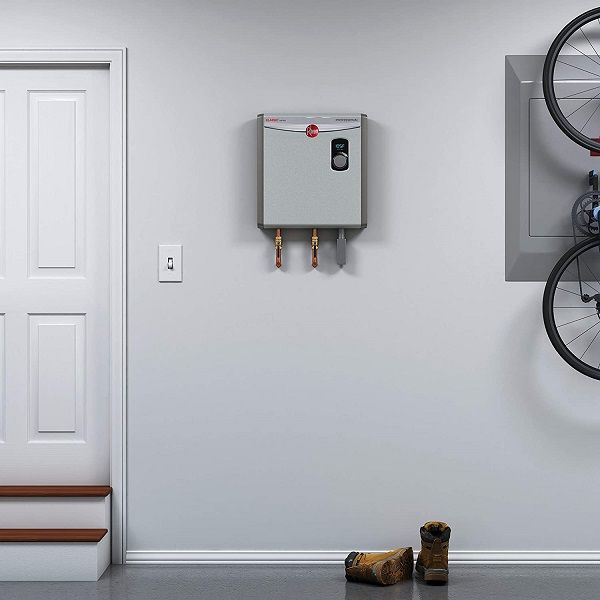
Tank Vs Tankless Water Heater
The benefits of a tankless water heater far surpass those of a tank water heater. Firstly, tank water heaters store heated water and are continuously operating to maintain the water temperature in the storage tank.
Tankless water heaters operate only when hot water is needed instead of operating the entire day. This makes them between 24% to 34% more energy efficient compared to tank heaters.
Tankless water heaters are constructed with the most durable materials to last you between 10-15 years, or even 20 years with some models. They will far surpass the lifespan of a tank water heater.
Tank heaters come with storage tanks which means they require more installation space. However, tankless units are small and lightweight in design and can be installed in closet spaces or a wall.
However, tankless water heaters are also a heavy initial investment. They range between $500 to $2000, compared to a tank unit that can be bought for between $400-$600.
Comparatively, tankless water heaters also have higher installation costs depending on the rewiring and adjustments your area needs. On average, it can cost between $1000-$2000 on installation costs as well.
Additionally, no matter the water temperature all year round, a tank water heater provides the same amount of hot water without varying differences in the water pressure.
Tankless heaters may have problems with the flow rate and water pressure if there are significant drops in the water temperature.
What Is A Tankless Water Heater?
If you’re looking into various fuel types for your tankless water heaters, propane heaters are one of the best.
They are one of the ultimate water heaters that help in cutting costs and provide hot water when you need it from the required outlet.
Propane tankless water heaters have a similar mechanism to tankless units. Propane water heaters use a propane flame when water needs to be heated.
Additionally, liquid propane is environmentally friendly and doesn’t pollute the environment.
Propane tankless water heaters are a great choice to cut costs, have hot water all the time while saving energy.
What Size Of Tankless Water Heater Do I Need?
To see which size and type of propane tankless water heater will be best suited for your home, you need to be aware of some factors.
Flow Rate
The flow rate of your propane water heater will tell you how much hot water you will require compared to the number of fixtures you’ll use.
The flow rate is measured in gallons per minute. Small-sized units have a smaller flow rate that operates best for small houses.
Similarly larger flow rates are preferable for whole house or large home installations.
Temperature Rise
You also need to familiarise yourself with the rise or fall in your water heater’s temperature.
The temperature rise is the difference in temperature between your normal water supply and the temperature you require.
You can find the difference in temperature rise by subtracting the temperature of your water supply and the output of the required temperature.
Size
With the right flow rate and temperature rise, you also need to deduce what your hot water usage and budget will be to cover your hot water needs.
If you’re operating multiple fixtures, you’ll need to consider if your unit’s size and flow rate can support that.
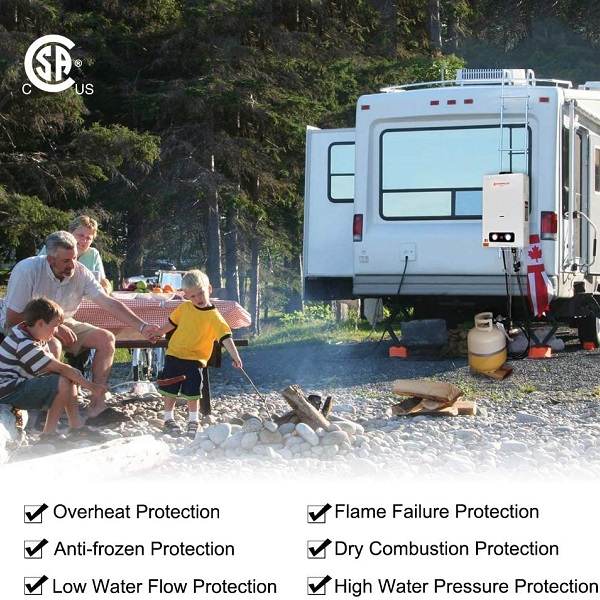
How To Pick A Tankless Water Heater?
Figuring out the right propane tankless water heater relies on several factors. Below are the features and specifications you need to look out for before purchasing a propane tankless water heater.
Flow Rate
The flow rate tells you how many gallons of hot water is dispensed per minute out of any faucet you’re using.
To understand which unit would have the optimum flow rate for your home, determine how many faucets or outlets are used at the same time for hot water.
If you have a household of 3 people or less, a flow rate of 6 GPM can operate a steady stream of hot water even on multiple fixtures.
If you’re a household of more than 4 people, you should get a unit with a starting flow rate of 8 GPM at maximum.
Energy Efficiency
It’s always recommended to get an energy-efficient unit that helps you save costs instead of adding to them.
Not only do units with higher EF ratings cut costs but they are also more eco-friendly but because they also reduce the emissions from greenhouse gases.
Temperature
Some tankless water heaters may cause fluctuations in the flow rate to get to the required temperature you need.
This depends on your area’s water supply as well. The colder your main water supply, the more your water heater needs to heat the water to warm it.
To get the correct temperature rate, you need to analyze the presiding temperature of the area you live in.
Size
If you have an average-sized home, a small and compact tankless water heater would be the best option for you.
Tank water heaters are heavier compared to tankless units since they come with a storage tank.
Before going for larger water heaters, make sure you have the space for installing them. If you’re a traveler, it’s best to get a portable outdoor water heater.
Price
In comparison, on average, tankless water heaters are more expensive. And propane tankless water heaters are even more expensive.
Propane tankless water heaters are more energy-efficient, cut more costs, and contribute fewer greenhouse gasses.
Propane water tankless heaters are priced at $200 and can go up to $2000!
Frequently Asked Questions on Tankless Water Heater
How Do You Flush A Tankless Water Heater?
First and foremost you need to disconnect or shut off your electricity or gas fuel outlet. After this ensure your water flow is also disconnected.
Next, attach two hoses to your cold and hot water valves. Ensure that the hot water hose is not connected to anything.
Attach a pump to the cold water hose and merge it in a 5-gallon bucket filled with at least 4 gallons of white vinegar. Place both the open ends of the hot and cold hose into the bucket.
Then open the valves and allow the vinegar to circulate for 45 minutes to an hour. After this connect the water supply to the cold valve and allow the vinegar to flush out.
Once it’s flushed, reconnect the valves and turn on your power fuel to use your tankless water heater normally.
What Is The Downside Of A Tankless Water Heater?
The first disadvantage is the initial cost. These units are expensive, however, smaller units sometimes can’t provide hot water to multiple faucets as well.
Additionally, tankless water heaters also require special venting installations.
Is It Worth Switching To A Tankless Water Heater?
Tankless water heaters have no storage tanks which makes them compact and lightweight. Additionally, they save more energy and overall costs annually.
Can You Run Out Of Hot Water With A Tankless Water Heater?
No, you cannot! A tankless water heater will supply endless water. However extra pressure on the water heater causes a decrease in the flow rate.
What Is The Lifespan Of A Tankless Water Heater?
With the proper maintenance and care, a tankless water heater can easily last between 15 to 20 years.
Conclusion
We’ve gathered for you the best tankless water heaters available on the market. You now know how and when a tankless water heater operates.
